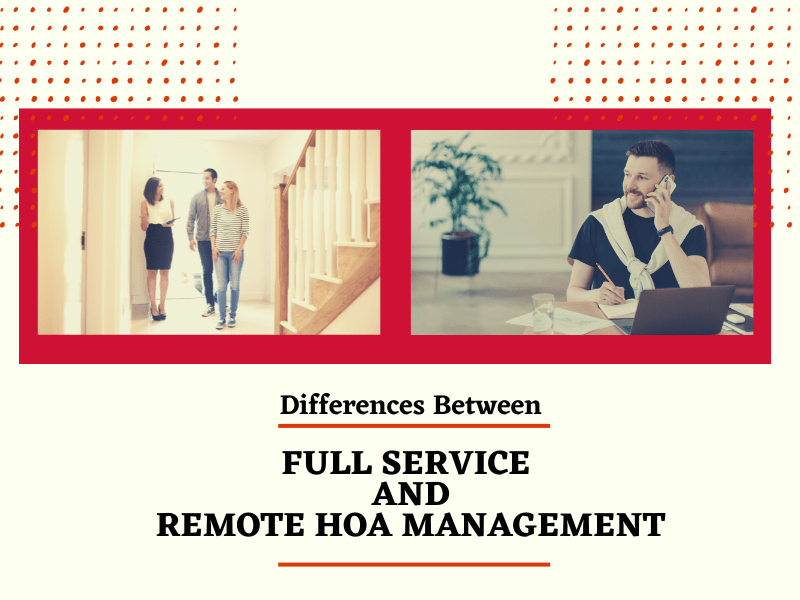When your HOA board decides that self-management is no longer sustainable, you’ll need to understand the different types of management services that are available to you. The needs of a small, 10-home association are far different from those of a 3,000-unit condominium complex. Maybe you’re hoping to delegate just about everything to a property management partner in order to improve your community and the HOA’s responsiveness. Or, maybe you just need some support and resources for specific things like financials and meetings.
It’s important to identify what you need before you choose an HOA management partner. Some companies will provide full-service, on-site management. Others will offer remote services, and some companies will give you an option to choose one or the other.
At Hill & Co., we know that every HOA is different. We ask some specific questions before we begin working with a new association in order to determine whether full-service or remote HOA management is best.
Let’s take a look at the different ways that full-service HOA management companies and remote HOA management companies provide their services and structure their fees. This might help you decide what’s best for your HOA.
Full-Service HOA Management
Full-service HOA management is typically done on-site, meaning your property managers will work within your community. The property manager you work with on a daily basis will be responsible for the day-to-day operations of your community. It’s convenient for a lot of HOAs, because the property manager is always there to problem-solve. Your full-service property manager will be available to the HOA board and the homeowners within the community. They can work with vendors and field questions.
Some of the services you can expect from your full-service HOA management company include:
- Accounting management, including accounts payable, accounts receivable, budgeting, and attention to the operating and reserve accounts.
- Maintenance and repair management, including responding to homeowner service requests and community-wide needs like fences, painting, landscaping, and amenity upkeep.
- Management of violations. Enforcing the bylaws, rules, and regulations of the community. Sending out violation letters and collecting fines and penalties.
- Managing architectural requests and variances from homeowners. Working with board members to approve, deny, and review all requests and managing correspondence regarding requests.
- Board and annual meeting management.
- Community inspections
- Customer service
Your HOA might benefit from this type of comprehensive management if there’s a lot of maintenance needed within the community. If emergencies are frequent or work is always needed, having a full-service management team will help you stay on budget and within projected timelines when repairs and improvements are made.
If you struggle with violations and keeping your homeowners in compliance, full-service management is also a good idea. When dues and fees are constantly late and you need someone making collection calls every day, you might need a third-party to enforce the rules and bring consistency to the association.
Remote HOA Management
Remote HOA management is growing in popularity, thanks to new technology and the growth of companies who specialize in these types of services.
This is a supportive type of property management, and it costs a lot less. When you partner with a company for remote HOA management services, you’re getting 75 percent of what a full-service company would do.
Remote management is a good option for HOA communities that do not necessarily need on-site management because there’s not a lot of ongoing maintenance. Maybe the community is a bit smaller and the homeowners are good about communicating, maintaining their standards, and paying their association dues.
Even with a community that’s well-run, you can still benefit from administrative assistance and resources. That’s what a remote management company will provide, and we’ll do it in a cost-effective way. All the services are still provided, including:
- Billing and collections
- Budgeting and accounting
- Homeowner communication
- Vendor management
- Meeting support
The difference is that your property management partner will not be on-site to perform tasks, talk in-person to board members and homeowners, or manage any conflicts or issues that may arise in the moment.
Deciding Whether Your HOA Needs Full-Service or Remote Management
As you decide what type of management plan will work best for your own HOA, think about a few important questions:
- What is your budget? Remote HOA management is definitely best for a community that’s on a smaller budget. If you cannot pay the full-service property management fees, remote management is a good way to get the help you need without spending more than you have.
- How quickly is your association growing, and can your board keep up with that growth? If things are beginning to feel unruly in your community and your board members cannot keep up with all of the new homeowners moving in, the new construction that’s expanding your community, or the repairs that are constantly needed, a full-service management plan might work best for you.
- Are there specific areas only where you are struggling? Maybe the board is having no trouble handling the homeowner communication and the vendor management and maintenance, but finances are increasingly difficult to keep up with. In this case, you’d be better with remote HOA management, where your property management team could focus specifically on financial reports and budgeting.
- Have you been self-managing or are you looking to leave your current management company? This will impact whether you want to start small, with a remote management service plan, or if you need something more than you were getting with your previous management company.
- Is your association or are the properties within the association unique in some way? If your HOA is in a horse community, for example, you might benefit from full-service, on-site management. If all of the homes are luxury estates, on-site management might be required for the level of service that your homeowners are expecting.

The board of directors will have the best understanding of how your community runs and what your association really needs. Spend some time exploring these options, and begin reaching out to HOA management companies that can walk you through the different options.
As you’re interviewing potential companies, we invite you to contact us at Hill & Co. We can deliver full-service management or remote management, depending on the needs of your California HOA.

